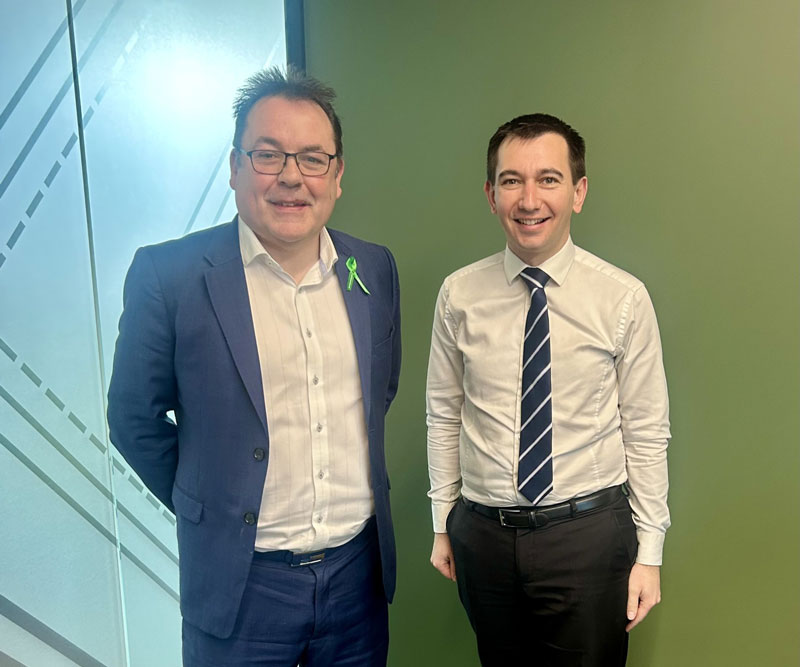Bowel Cancer NZ Chief Executive Peter Huskinson pictured with Hon. Simeon Brown at the Auckland Policy Office.
Bowel Cancer New Zealand met with Hon Simeon Brown last week to push for two life-saving measures: lowering the national bowel screening age and introducing a supported exercise programme after chemotherapy.
The meeting was constructive, with the Minister outlining work taken in response to the charity’s screening proposals put to him in February. Work is now underway on both measures – but screening timelines remain unclear. A further meeting later this year was agreed.
Work on screening age progressing – but no plan yet
Bowel Cancer NZ reiterated its costed proposals, first presented to the Minister in February, showing how the Government can deliver on Prime Minister Christopher Luxon’s 2023 pledge to match Australia’s screening age of 45. The plans are achievable, affordable, and reinstate earlier screening for Māori and Pacific peoples – groups with worse survival rates under the current one-size-fits-all approach.
The Minister confirmed that improvements in investigations for people with symptoms are rolling out from this month – a key enabler for lowering the screening age. He acknowledged that moving to 58 is only a step on the journey, describing it as “a step, but it’s not enough” – signalling the Government recognises the need to go further.
Bowel Cancer NZ Chief Executive Peter Huskinson said:
“It’s encouraging that our proposals are being taken seriously – but we need solid timelines. Every month that goes by, more than 50 Kiwis in the age group that can access screening in Australia are diagnosed with bowel cancer.”
The minister stated that modelling to inform next steps is not expected until late 2025 or early 2026, leaving little time to implement changes before the next election.
Under BCNZ’s proposals, screening from 45 could be implemented swiftly, with earlier eligibility for Māori and Pacific peoples reinstated. Without this, stark inequities remain, with many people developing bowel cancer before reaching the current starting age of 60.
Ball rolling on major survival gains through exercise after chemotherapy
Bowel Cancer NZ also presented evidence from the landmark CHALLENGE trial, which shows that a structured behaviour change and exercise programme after chemotherapy increases eight-year survival rates by 7% for Stage 2 and Stage 3 patients – saving more than 50 lives each year in New Zealand.
“This is one of the biggest survival gains we’ve seen in years,” said Huskinson. “It’s highly effective, highly affordable, and could be rolled out nationwide within 12 months. We want to see the Government champion this and make it standard care.”
The Minister responded positively, asking officials to provide further advice and inviting BCNZ to meet with the Ministry of Health and Health New Zealand to discuss modelling and next steps.
Next steps
The meeting ended with a commitment to meet again.
“Many New Zealanders are frustrated and rightly want faster action. We share those concerns and will keep pressing the case for change,” said Huskinson. “Kiwis facing the impact of bowel cancer don’t have time to wait. Every month matters, and we’ll keep advocating until these life-saving measures are delivered.”
Bowel Cancer NZ will continue working to ensure all New Zealanders benefit from timely equitable screening, high-quality treatment, and innovative post-treatment care – to work towards a future where no life is lost to this disease.

